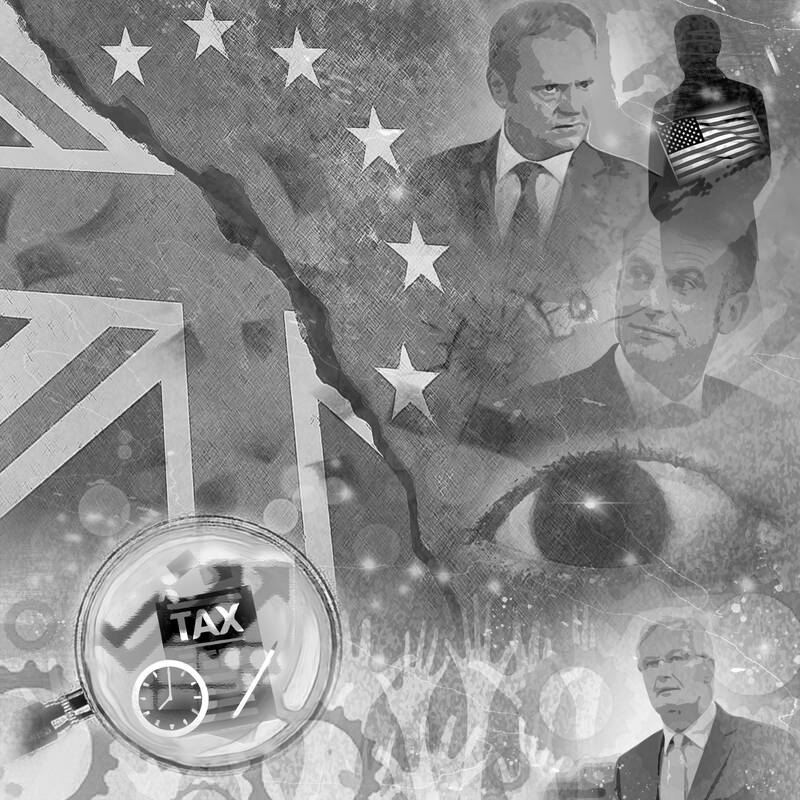The European leaders who once protected the principle of a common market have turned on each other
When the UK’s Brexit referendum yielded its unexpected result in 2016, the European Commission enlisted three men to ensure that the decision to leave the EU would be remembered as utter folly. Today, the same three men remain in the highest echelons of the EU’s political pantheon — only now they are singing from the Brexiteers’ hymnal. To understand why is to grasp the EU’s deepening crisis.
Michel Barnier, a former EU commissioner, was selected to lead the day-to-day negotiations with the UK, with a remit to grind down the British envoys and extract a pound of flesh from them at every turn. Donald Tusk, then president of the European Council, even launched an ill-fated campaign for a second referendum, undiplomatically suggesting that the Brexiteers deserved a “special place in hell.” Finally, Emmanuel Macron, having won the French presidency, led the discursive battle against the spirit of Brexit from the towering heights of the Elysee, warning his British counterparts that they would never be allowed to cherry-pick the bits of the EU that they liked while ditching the rest.
The three men went to war against the Brexiteers with three objectives in mind. First, they sought to defend the coherence of the EU’s single market, in particular the idea of a level playing field where a French, Portuguese, and Slovenian company faced — at least in theory — the same rules. In contrast, Brexiteers on the right and the left were adamant that the UK government should reclaim the right to offer state aid to strategically important companies investing on British soil. Macron took up this fight, condemning UK efforts to tilt the field in favor of handpicked British companies at the expense of the EU’s cherished single-market principles.

Illustration: Kevin Sheu
Second, they sought to quash any hopes the British had of free-riding on the EU’s common institutions in favor of the City of London. Tusk built a team to ensure that the final Brexit deal would penalize UK financiers who refused to relocate a substantial proportion of their portfolio, personnel, and investments within the EU. Tusk told British financiers in no uncertain terms that, for them, “life will be different” after Brexit.
Lastly, they wanted to portray the Brexiteers as misguided enemies of the EU’s other cherished principle: freedom of movement. Time and again, Barnier told the British negotiators that the only way the UK could continue to enjoy tariff-free trade with the EU was to ditch its absurd demand to take back control of its borders. Even recently, Barnier was adamant: “No Brexit renegotiation without free movement,” he said in June.
Today, all three EU game wardens have changed their tune, adopting the language and policies of the Brexiteer poachers they had been enlisted to confront. First came the end of the pretense of defending a level playing field for companies across Europe. Confronted by the slump brought on by the COVID-19 pandemic, France and Germany reasserted the right to offer state aid.
“The response we have had in Europe in recent years,” as Macron put it, “has been to provide national flexibility: state aid.”
Meanwhile, German Chancellor Olaf Scholz was flexing his government’s muscles to block a perfectly legal takeover of Commerzbank by Italy’s UniCredit, undermining the possibility of a single EU financial market.
Far more startling is the Damascene conversion of the other two men. Tusk, discovering his inner Brexiteer, seems to have forgotten how wrong it is for an EU member state to want to reassert control of its borders. Now, as Poland’s prime minister, Tusk vows to, you guessed it, “take back control” of Poland’s frontiers, demanding a UK-style exemption from EU rules on the minimum number of asylum seekers European countries must accept. In fact, Tusk has gone even further, suspending the right to asylum in Poland for those coming from Belarus and Russia, in gross violation not only of EU rules but also of Poland’s obligations under international law and the European Court of Human Rights — a traditional target of Brexiteer venom.
Not to be outdone by Tusk, Barnier, now France’s prime minister, is leading a minority government relying on the tacit support of the Euroskeptic, xenophobic Marine Le Pen and her National Rally. He has campaigned for immunity from European courts’ jurisdiction so that France can deport whomever it wants, and even to legislate a ban on all non-EU immigration.
What happened? How did the EU’s gamekeepers become poachers? The answer lies largely in Europe’s brittle economic foundations. Renationalization of policy was always in the cards once the common project of “ever closer union” lost its shine. Nearly two decades of underinvestment have reinforced the centrifugal forces tearing Europe apart, spreading the spirit of Brexit from Paris to Warsaw.
Since the pandemic, EU exports to China have flatlined while the US almost doubled its imports from Europe. Totally reliant on the US for arms, fossil fuels, and external demand, the EU is immensely vulnerable. Now that US president-elect Donald Trump has won his country’s presidential election after campaigning on higher tariffs for EU exports, Europe would face deeper stagnation and fragmentation.
It is a tragic indictment of Europe’s leaders that, by holding out for so long against moderate but fundamental political reform of the EU, they guaranteed its disintegration. By paying lip service to Europe’s common needs (such as large-scale green investments), without any interest in building up the necessary common means, they became the EU’s most destructive saboteurs. Brexit has come home to roost.
Yanis Varoufakis, a former finance minister of Greece, is leader of the MeRA25 party and professor of economics at the University of Athens.
Copyright: Project Syndicate








